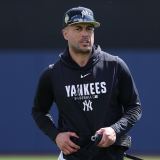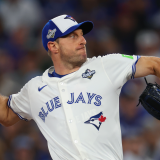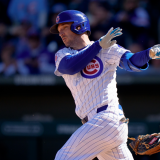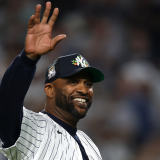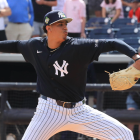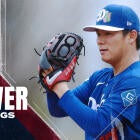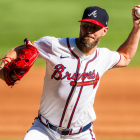
Astros' slow start: Five things to know, including José Abreu's struggles, Mauricio Dubón's surprising gains
The defending champions haven't stormed out of the gate, but all indications are they'll be fine

From afar, it may appear that the Houston Astros have been suffering from a World Series hangover in the early going. They entered the weekend with a 9-10 record on the young season, and at one point in the last 10 days they occupied fourth place in the American League West. The Astros are not accustomed to looking up at anyone in the division, let alone three others.
The Astros have since course-corrected. They swept the Atlanta Braves over the weekend, and a series-opening loss on Monday to the Tampa Bay Rays still had them in second place with a 12-11 record. They're 2 1/2 games back of the Texas Rangers, but it's April 25 and there are worse spots to be in.
With the season almost a month old, we here at CBS Sports decided to check in on the defending World Series champions to see what, precisely, is going on. Below, you'll find five things worth knowing about the Astros' start.
1. Abreu struggling early
The Astros had an eventful offseason, but most of their personnel changes occurred in the front office. Indeed, only two players on Houston's current 26-player roster were not with the organization at the end of last season: reserve infielder Rylan Bannon and first baseman José Abreu. With due respect to Bannon, it's more than fair to say Abreu possesses the edge in notoriety.
The Astros' decision to sign Abreu to a three-year pact worth more than $58 million raised eyebrows around the industry at the time. People didn't scoff because they believed Abreu was a bad or otherwise undeserving player; they did question how the second and especially the third season would play out given that he was already approaching his 36th birthday. For now, the Astros have to concern themselves with how the first season is going.
Another one. pic.twitter.com/CaBdyelSX2
— Houston Astros (@astros) April 23, 2023
Abreu enters Tuesday hitting .250/.287/.281 (61 OPS+) with no home runs and 20 more strikeouts than walks in his first 101 trips to the plate. Those marks are, of course, well beneath his established standards. Abreu's ball-tracking metrics aren't any prettier. He's sporting an average exit velocity below 87 mph, and just 36 percent of his batted balls have featured an exit velocity of 95 mph or better. His average fly ball distance is less than 300 feet, or more than 20 feet below both the league-average mark and his average from last season.
Abreu's track record of hitting is such that the smart conclusion to make here is that it's just a matter of time before he gets going. After all, April has historically been his worst month; this is a small sample size; and it shouldn't surprise anyone if he's maybe pressing just a wee bit to justify his contract. Still, Abreu is old enough where every prolonged slump will raise questions about whether or not this is the beginning of the end for him, which makes his woes worth monitoring as the season burns on.
2. Poor performance in one-run games
The Astros trail the Rangers by 2 1/2 games, a margin that can be explained entirely by Houston's 0-3 mark in one-run games. While there are certain traits that can cause a team to perform better or worse in one-run games than the average team -- a great or lousy bullpen; a clever or dimwitted manager; and so on -- it's usually fair to assume extreme performances on both ends of the spectrum will regress over the course of the regular season. The Astros, most assuredly, will not lose every one-run game that they play in this year.
On a related note, the Astros are tied for the worst "luck" in the majors -- or, the biggest gap between a team's expected record based on their run differential and their actual record, according to Baseball Reference's calculations. For those who didn't know, run differential boasts greater predictive power in small samples than a team's actual won-lost record. That's good news for the Astros, who rank seventh in the majors after outsourcing their opponents by 22 runs. Their "expected" record based on that is 14-9.
As with a team's record in one-run games, it's usually safe to assume that a team will play closer to its run differential as the sample size increases. There's no apparent reason why that would not prove to be the case here.
3. Still without key veterans
Teams are often defined by who is on their roster, but the inverse -- who isn't on their roster -- can also make a difference. The Astros, for example, are without four notable players: second baseman Jose Altuve, outfielders Michael Brantley and Chas McCormick, and starting pitcher Lance McCullers Jr.
The Astros have reason to be pleased with how Mauricio Dubón and Corey Julks have played, and how well Hunter Brown has taken to the big-league rotation. Even so, don't discount the impact of being without those four players. Consider that both Brantley and McCullers were compromised by injuries last season, yet the foursome still combined for more than nine Wins Above Replacement.
Even with some of the replacements performing well -- including Brown, the rookie right-hander, and a few others we'll cover below -- the Astros roster would be better, and deeper, if they were closer to 100% healthwise.
4. Benefitting from surprise contributors
We've touched on a lot of negative aspects throughout this piece. How about throwing in a positive or two? The Astros have to be pleased with the contributions they've received from a pair of unlikely hitters: second baseman Mauricio Dubón and 27-year-old rookie outfielder Corey Julks.
Dubón with the dive.@stihlusa x #Ready2Reign pic.twitter.com/amr1EyoTMX
— Houston Astros (@astros) April 15, 2023
When Altuve went down, Dubón seemed like the less-inspiring of the Astros' internal options at the keystone. Yet it's been him, not David Hensley, who has emerged to date. In his first 84 plate appearances, he's batting .325/.345/.400 (109 OPS+) with five extra-base hits and a steal. Arguably more interesting than his statline is how he's achieved those figures. Dubón is sporting an in-zone contact rate near 90%, and that's from someone who, as recently as 2021, was doing well to keep that number over 80%. It's difficult to "fake" improving in that respect for long, so put a star next to Dubón's name -- he might have already transformed his skill set in a notable way.
A Julks of energy in the 8th. pic.twitter.com/7G1zysr23x
— Houston Astros (@astros) April 23, 2023
Whereas Dubón had a big-league track record to speak of, even if it was negative in respect to his offense, Julks is attempting to become this year's Oscar Gonzalez -- that is, the most productive player who was passed over in the previous winter's Rule 5 Draft. Even the Astros did not deem him worth a spot on the 40-player roster. Julks played his way onto the Opening Day roster, and he's hit .305/.311/.458 in his first 17 contests. He's authoring a good story, and it's clear he has above-average pop; he will need to fine-tune his approach more (he has an atrocious 0.05 walk-to-strikeout rate) in order to stick long-term.
5. Customary slow starters
We'll close out by noting the Astros have made a habit in recent years of starting slow. They finished last April with an 11-10 record and a negative run differential. In 2021, they lost series to the Detroit Tigers and Colorado Rockies en route to a 7-10 start. (They finished April with a 14-12 record.) The Astros showed no ill effects from either slow start, of course. They reached the World Series both falls, and along the way won a combined 201 regular season games.
In other words, all indications are these Astros will be just fine.


